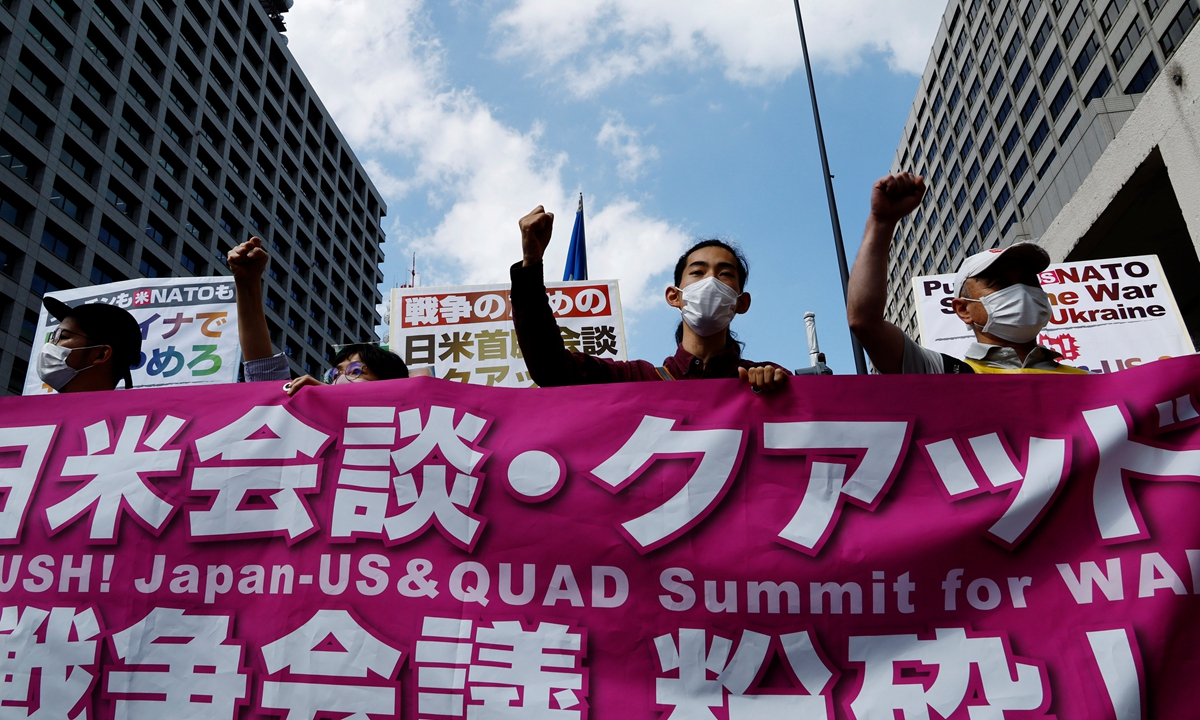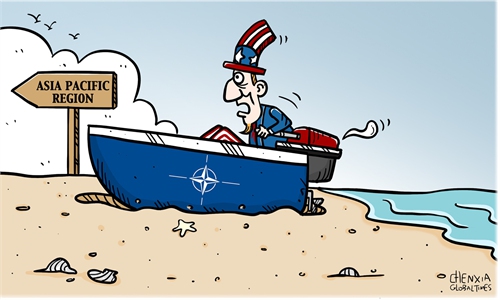
Protesters shout slogans during a march against talks between US President Joe Biden and Japanese Prime Minister Fumio Kishida and the Quadrilateral Security Dialogue (Quad) summit among the US, Japan, Australia and India leaders in Tokyo, Japan on May 23, 2022. Photo: IC
On the last day of his Asia trip on Tuesday, when US President Joe Biden attended the Quad summit in Tokyo with leaders from Japan, Australia and India, he vowed "steadfast commitment to a free and open Indo-Pacific that is inclusive and resilient."
While analysts said that without mentioning China by name, the mechanism has made China the heart by hyping the country's "threat," and no matter how it has sugarcoated its target to contain China, fewer regional countries will be fooled.
The Tuesday summit is the fourth meeting, but the second in-person one of the Quad - a group widely seen to aim at containing China. Anthony Albanese, who flew to Japan to attend the meeting in Tokyo, just hours after being sworn in as the new Australian prime minister, assured his Indo-Pacific counterparts that the new Australian government remains committed to the Quad. Indian Prime Minister Narendra Modi also attended the summit and later had a meeting with Biden, according to Japanese media.
According to a White House transcript on the remarks of the four leaders during the summit, the word "China" was mentioned once by Biden. Likewise, in the joint statement released on Tuesday, China was not mentioned directly but referred to as "challenges to the maritime rules-based order" in the East and South China Seas.
In response to the Quad summit's reference on China's maritime activities and its hype of the "China threat," China expressed firm oppositions and has lodged representations, Chinese Foreign Ministry Wang Wenbin told a routine press conference on Tuesday.
Wang said that China has always been the builder of global peace, contributor of global development and defender of international order. "We will not allow any country to interfere with China's domestic affairs and to smear China's international image," said Wang, adding that "We hope certain countries would not see China through tinted glasses and make unwarranted accusations. Building small cliques and stoking bloc confrontation is the real threat to a peaceful, stable and cooperative maritime order."
The US is sugarcoating the Quad mechanism's target of containing China with less political and confrontational issues to make it more acceptable to regional countries. By lowering the threshold for the small clique, it attempts to attract more participants, and with the possible expansion of Quad, more geopolitics will be added, Sun Chenghao, a research fellow from Center for International Security and Strategy of Tsinghua University, told the Global Times on Tuesday.
For example, the joint statement covered topics on many areas, including maritime, economy, and COVID-19 cooperation. Among a range of initiatives unveiled on Tuesday, one is the Indo-Pacific Partnership for Maritime Domain Awareness (IPMDA), which will allow member countries to monitor illegal fishing, track "dark shipping" and other tactical-level activities.
The Quad mechanism highlighted targeting China and cementing US leadership with the expansion of US allies. Making Asian countries switch to the US on economy, technology and trade would be a way to isolate China. The US' ultimate goal is to force them to completely take the sides of the US over China and pose long-term economic pressure on China, Zhu Feng, a professor of international relations at Nanjing University, told the Global Times on Tuesday.
Zhu noted that traditionally, US allies in Asia rely on the US for their security but align with China on trade and economy, a situation that the Biden administration has longed to change. This is also why the US is promoting the Indo-Pacific Economic Framework (IPEF) together with a string of other cooperative initiatives.
Proposed by Biden in October 2019, the IPEF is widely seen as the US' geopolitical tool to isolate China from the global supply chain.
The ongoing Russia-Ukraine conflict has also been mentioned in the joint statement, saying that "Quad Leaders reiterated our strong resolve to maintain the peace and stability in the region." Such rhetoric is inconsistent with what some media previously predicted as not "muscular" considering India's stance on the topic.
However, as the US is working hard to conflate the Ukraine crisis with the Taiwan question to deny the Chinese mainland sovereignty over the island, the leaders of the Quad reiterated a "free and open Indo-Pacific" and not allowing any attempt to change the status quo by force. Biden was also asked by media whether the remarks he made in the previous day to "intervene militarily" means changing to "strategic ambiguity." He denied this.
By hyping the Russia-Ukraine crisis and the topics on the island of Taiwan, the US is adding "legitimacy" to its increasing presence in the Indo-Pacific region, analysts said, noting that actually its meddling in regional affairs is the biggest challenge to the region.
On the same day when the Quad summit was held, China and Russia carried out a regular joint strategic patrol in the Asia-Pacific region for the fourth consecutive year, a move experts said displayed a high level of military cooperation between the two major powers that contributes to peace and stability both in the region and in the whole world at a time when both countries are facing stern, provocative pressure from the US.
"A free and open Indo-Pacific" had been repeatedly noted during the Quad summit. Zhu said that topics on South China Sea, East China Sea and the island of Taiwan will be acting points for the US to further rally its allies and to pressure regional countries to declare loyalty to the US. These factors will be used for Quad to expand itself.
Zhu said that the Taiwan question is not the only topic of the US' long-term strategy toward China. It also attempts to widen the gap between China and the US in the global supply chain, especially on key areas, and further isolate China on geopolitics to seek "overwhelming superiority" against China. In response, China needs to make more comprehensive strategic analysis.
Although US national security adviser Jake Sullivan told reporters in a press conference on May 18 that Biden's Asia trip is to "put on full display" his "Indo-Pacific Strategy" and to show US leadership in response to Russia on Ukraine and other fields, observers noted that the US may neither successfully contain China by various mechanisms it has built in the Indo-Pacific nor underscore its leadership in the region.
Lü Xiang, a research fellow at the Chinese Academy of Social Sciences, said that the US-led Quad has very little room to make a fuss about the South China Sea issue, as China and the ASEAN members are jointly maintaining a peaceful state in this region.
No one is against peace and freedom in the South China Sea or even the entire Asia-Pacific region. China also supports an open and free South China Sea and has never restricted any country, and no one should restrict China in the name of openness and freedom, said Lü. He noted that if countries outside the region are bent on making trouble in this area, they will inevitably be opposed to by all countries in the region.
Although the Biden administration came up with a more clever and flexible way to draw regional countries via different mechanisms on different agenda, its purpose to coordinate all these mechanisms to target China and to make these countries to be subject to the US' orders is still difficult, Sun said.
Aside from common distrust of the US, each country in the region has its own concerns. As the US has been dragged in Europe by the Ukraine crisis, how much money, resources and energy it has and can be invested to support its pivot to Asia remain a big question, Sun said.
Take India. In facing Biden's criticism of Russia over the Ukraine crisis on Tuesday, Modi did not follow due to what media said was "close relations" with Russia and India's stance on the Ukraine crisis.
Sun noted that the US wants to burnish its image as a "benign super power" to regional countries and to picture China as the "bad one." However, it continues to fan the flames by offering weapons, and it also introduces outside forces, especially NATO, to destabilize the region, which have worried regional countries.
Voices calling for high vigilance of disorder and chaos that the US may bring to the region came with Biden's Asia trip. In South Korea, protesters gathered in front of where Biden stayed in Seoul, holding banners that said "World peace destroyer, Biden Out." On Sunday when Biden arrived in Japan, anti-war groups gathered in Tokyo's bustling Shinjuku to protest the Quad clique.
Itsunori Ikeda, a leader of the protest, told the Global Times on Sunday that the Quad is using the "China threat" as a pretext to expand its armament to counterbalance China. The combined military expenditure of these four countries is several times that of China's, and the Quad is not ironclad and the interests of the US, Japan, India and Australia are not entirely aligned.

